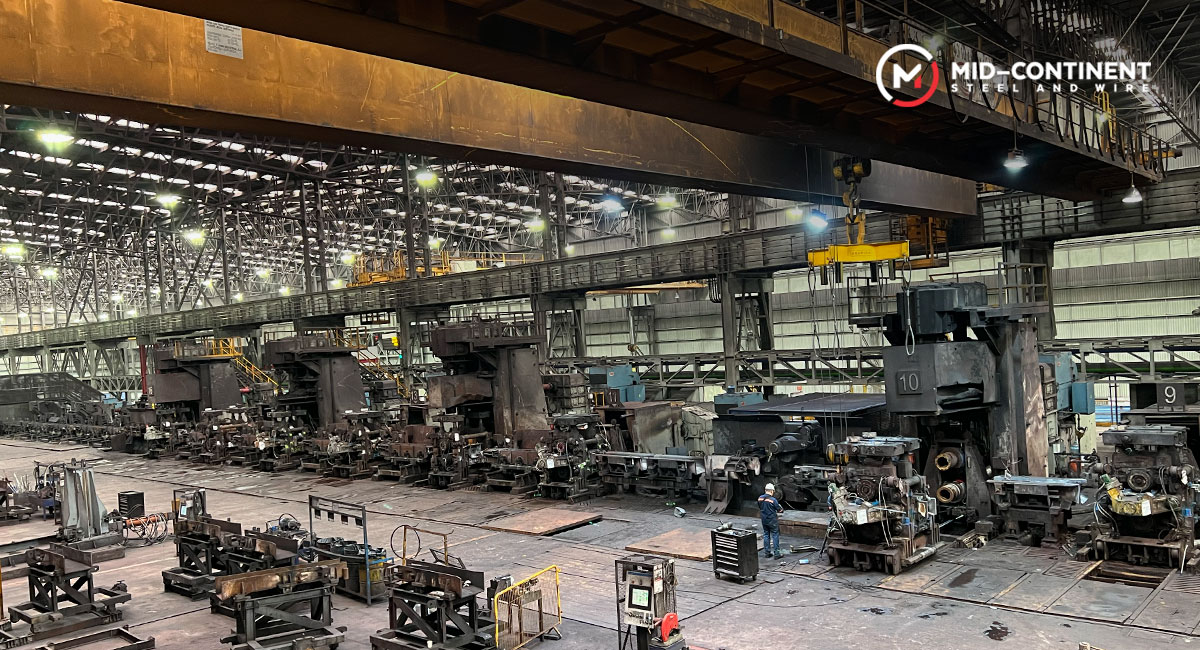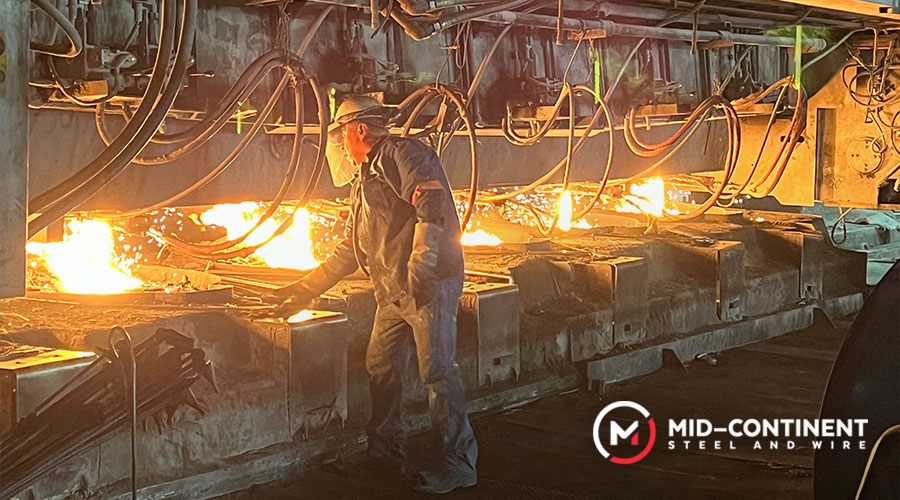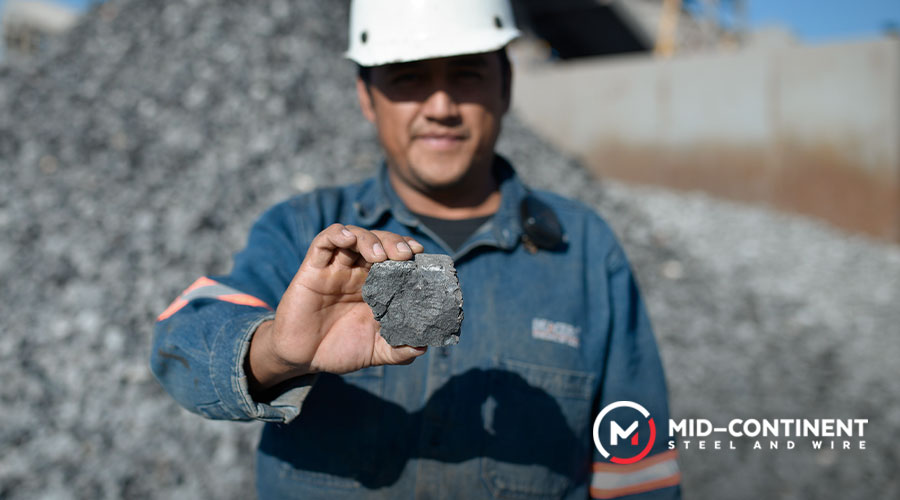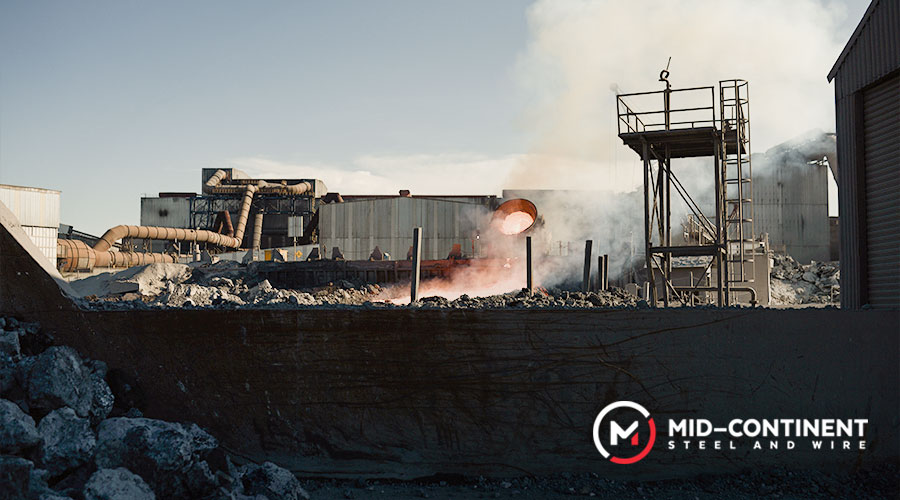
Sustainable steel production methods are pivotal in working towards achieving the release of fewer carbon emissions into the atmosphere. At Mid-Continent Steel and Wire, we consider them a key factor in our operations. Let’s dive into some approaches to green steel manufacturing.

Common challenges in steel production
Some common challenges can come up in sustainable steel production, such as:
- High costs of production: The transition to sustainable methods often requires significant investment in new technologies like electric arc furnaces and hydrogen-based steelmaking, which can be expensive.
- Sourcing sustainable energy: Sustainable steel production relies heavily on access to affordable, renewable energy, which can be hard to come by.
- Quality of recycled materials: Utilizing scrap metal as raw material can pose challenges in maintaining the quality and properties of the steel produced.
- Technological limitations: Existing technologies for reducing carbon emissions are still under development and require further innovation and scaling to be widely implemented across the industry.
- Regulations and policies: Navigating different regulatory frameworks and policies to promote sustainable practices can be complex and can vary significantly by region.

The importance of sustainability in steelmaking
Sustainability in steelmaking is crucial for shaping a more resilient, economically viable, and socially responsible industry. These are some of how it benefits everyone.
- Environmental impact: The steel industry is one of the largest industrial sources of carbon dioxide emissions. Implementing sustainable practices helps significantly reduce them, contributing to global climate change minimizing efforts. Renewable energy sources further decrease the industry’s carbon footprint.
- Resource efficiency: Sustainable steelmaking involves recycling scrap metal and utilizing resources more efficiently, reducing waste and promoting a circular economy. This ultimately minimizes the demand for raw materials, conserving natural resources.
- Economic benefits: Transitioning to sustainable steel production can open new market opportunities and offer competitive advantages as consumer demand shifts towards environmentally conscious products.
- Regulatory compliance: Many countries are implementing stricter regulations on emissions and resource usage. Adopting sustainable practices makes sure to comply with current and future regulations, avoiding fines and penalties.
- Social responsibility: Engaging in sustainable practices enhances social responsibility, meeting the growing expectations from consumers and stakeholders for a greener future.

Some of Mid-Continent Steel and Wire’s green practices
Green steel production involves efforts to reduce greenhouse gas emissions, manage resources, and promote a circular economy. Some innovative technologies and practices are being implemented by industry leaders. Mid-Continent Steel and Wire (MCSW) is actively contributing to environmental sustainability through several initiatives:
- Recycling and reduced emissions: MCSW focuses on collecting and recycling scrap materials to produce high-quality steel, significantly reducing CO2 emissions and achieving an impressive decarbonization rate. Our steel mills boast some of the lowest CO2 emissions per ton globally.
- Sustainability certifications: We adhere to strict energy consumption standards, earning a LEED certification. We are committed to maintaining environmentally friendly processes in every operation.
- Community and global initiatives: MCSW participates in initiatives like the UN Global Compact and the US Green Building Council to support broader sustainability and community goals.
- Environmental, social, and governance (ESG) compliance: MCSW promotes transparency in our ESG initiatives, incorporating green practices and emphasizing staff training to foster a culture of compliance and environmentally friendly processes.
- Electric arc furnaces: We work to reduce the carbon footprint of steel production with the utilization of electric-powered furnaces. This method uses electricity to melt scrap steel, significantly lowering carbon emissions compared to traditional blast furnaces.
Making the American steel industry more sustainable one product at a time! Visit our catalog of solutions to make your project greener.

